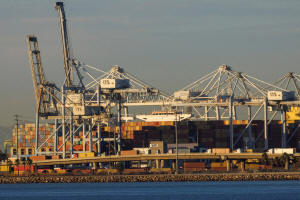White House unveils more steps to strengthen U.S. supply chains
 Send a link to a friend
Send a link to a friend
 [February 24, 2022]
By Andrea Shalal [February 24, 2022]
By Andrea Shalal
WASHINGTON (Reuters) - The White House on
Thursday announced 10 new steps as part of its year-long drive to
strengthen U.S. supply chains against climate shocks and geopolitical
tensions, and ensure that China or others cannot weaponize supply chains
against the United States.
Senior administration officials said the United States had made good
progress since President Joe Biden signed an executive order one year
ago that kicked off efforts to bolster domestic production of
semiconductor chips, batteries for electric vehicles, rare earth
minerals, and pharmaceuticals.
But they said more work was needed to address lingering supply chain
challenges and strengthen the domestic industrial base - a process they
said would yield some short-term gains but was also focused on
longer-term structural changes.
Biden has been personally focused on rebuilding U.S. supply chains after
acute supply shortages at the start of the COVID-19 pandemic squeezed
the availability of masks, gloves and other personal protective
equipment, and a dearth of semiconductors jacked up the cost of cars and
sent inflation to 40-year highs.

While the push is aimed at yanking back from China the production of
technology and other goods once dominated by the United States, it is
also meant to make U.S. supply chains more resilient to climate change
and other disruptions, natural or manmade, one of the officials said.
Seven Cabinet agencies were due to publish six reports mapping out plans
to address weaknesses in some of the nation's most crucial supply
chains, including transportation, health care, defense and food, the
White House said.
[to top of second column]
|

Container trucks , ships and cranes are shown at the Port of Long
Beach as supply chain problem continue from Long Beach, California,
U.S. November 22, 2021. REUTERS/Mike Blake/File Photo
 One common thread is the need to
help small and medium-sized businesses compete and break up the
domination by a few large corporations of businesses including
meatpacking and distribution, the White House said.
Key steps planned include:
- an Export-Import Bank initiative to boost financing for domestic
production of semiconductors, biotech and biomedical products,
renewable energy, and energy storage.
- expanding access to capital for small manufacturers through new
and existing programs at the Department of the Treasury and the
Small Business Administration, including $10 billion in American
Rescue Plan funds.
- opening a $450 million Department of Transportation program to pay
for improvements at U.S. ports, and funding for other transportation
infrastructure projects under the bipartisan infrastructure law.
- a new "Buy American" rule due out in coming weeks that will offer
enhanced price preferences and raise the domestic content threshold
for a new category of critical products
- use of the Defense Production Act to build and expand the health
resources industrial base and reduce the current "critical
dependence" on imports for key pharmaceutical products and active
pharmaceutical ingredients.
(Reporting by Andrea Shalal; Editing by Leslie Adler)
[© 2022 Thomson Reuters. All rights
reserved.] This material may not be published,
broadcast, rewritten or redistributed.
Thompson Reuters is solely responsible for this content. |